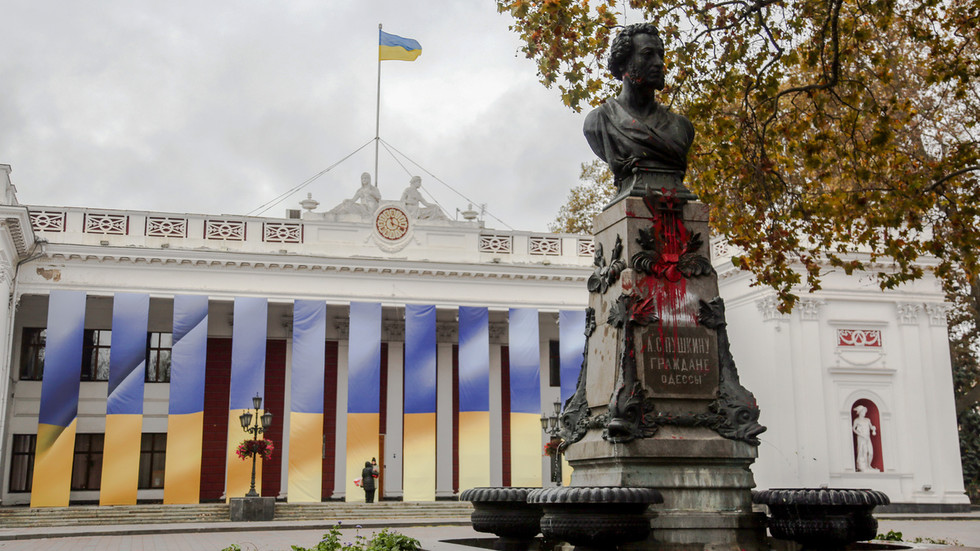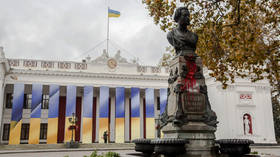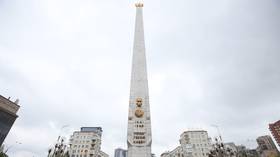
The writer has been targeted and harassed by nationalists and Ukrainian domestic intelligence alike, ultimately scrapping the idea

The monument to Alexander Pushkin doused with red paint at Dumskaya Square in Odessa, Ukraine on November 18, 2023. © Getty Images / SOPA Images / LightRocket / Viacheslav Onyshchenko
Ukrainian writer and public activist Ekaterina Bogachinskaya found herself in hot water over her idea of holding public readings from the works of celebrated poet Alexander Pushkin in the southern port city of Odessa.
The activist floated the idea on Thursday in a Facebook post, calling on Pushkin lovers to come to the iconic Russian poet’s monument in the city this Sunday to read poetry and “culture essays” in public. Bogachinskaya cited concerns that the recently-vandalized monument, which is on a special UNESCO list, may end up demolished despite its protected status, and society should show its stance on the matter. The activist also suggested the readings should become a weekly event, demonstrating that “culture does not have borders or national limits for us.”
The idea, however, promptly fell flat, as Bogachinskaya’s social media feeds got flooded by angry Ukrainian nationalists. Multiple commenters issued death threats to the activist, accused her of working for Russia, and even expressed regrets that Odessa “does not get bombed enough” amid the ongoing conflict between Kiev and Moscow. Some threatened her with the Ukrainian domestic intelligence agency, the SBU, stating agency officers would love to visit the readings as well.
On Friday, Bogachinskaya released a video bemoaning the threats and denouncing the “hate” poured on her. She also revealed the SBU had indeed summoned her for questioning, and the talk was expected to be “fun.” She also claimed that many people have expressed support for her and the Pushkin-readings idea, in direct messages.

Later in the day, having visited the SBU, Bogachinskaya released a follow-up video, apologizing for the readings idea and stating that if she’d known it would prompt such a “war” between the “two sides,” she would have never floated it in the first place. She also deleted all the posts related to the affair and shut down her Facebook page.
Alexander Pushkin (1799-1837) has been among several iconic Russian figures to invoke the wrath of Ukrainian nationalists, with monuments commemorating the iconic poet repeatedly attacked across Ukraine. Last week, a monument to the poet was dismantled in the capital, Kiev, after it had been repeatedly attacked by unknown vandals.
Ukraine adopted a so-called “decommunization” policy shortly after the 2014 Maidan coup, officially aimed at weeding out the country’s Soviet past. The policy effectively resulted in arbitrary attacks on anything even remotely Russian, with Pushkin, who obviously has nothing to do with communism, ending up among the prime targets.
Moscow has repeatedly criticized authorities in Kiev for what it considers to be a “forceful Ukrainization and de-Russification,” with Russian President Vladimir Putin citing such policies as one of the reasons behind the conflict between the two nations.




